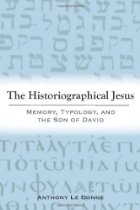Anthony Le Donne has published works arguing for a new type of historical study, one that draws upon memory theory, to be applied to the Gospels. He and a number of scholarly supporters believe this new approach can open up a more valid way of approximating the historical Jesus behind the Gospels.
 In the opening pages of his opening chapter of The Historiographical Jesus: Memory, Typology, and the Son of David (2009) Le Donne zeroes in on what he believes is a prevalent fallacy among scholars addressing historical questions in the Gospels and Acts. This is that a good number of well-known scholars have argued that an event in the Gospels-Acts that is expressed as some “typology” or fulfillment of an Old Testament passage should not be thought of as historical, or that it should at least be relegated to a status of questionable historicity. On the other hand, events written as facts and that contain no striking overlay of such Old Testament framing should, rightly, be considered historical, or at least be acknowledged as historical in the mind of the author.
In the opening pages of his opening chapter of The Historiographical Jesus: Memory, Typology, and the Son of David (2009) Le Donne zeroes in on what he believes is a prevalent fallacy among scholars addressing historical questions in the Gospels and Acts. This is that a good number of well-known scholars have argued that an event in the Gospels-Acts that is expressed as some “typology” or fulfillment of an Old Testament passage should not be thought of as historical, or that it should at least be relegated to a status of questionable historicity. On the other hand, events written as facts and that contain no striking overlay of such Old Testament framing should, rightly, be considered historical, or at least be acknowledged as historical in the mind of the author.
Anthony Le Donne quotes Michael Goulder’s explicit expression of this principle:
Where . . . we find passages with no apparent root in symbolism, or with unimportant traces of types, we shall be justified in assuming that St. Luke was setting down a factual story. . . . This will be our first criterion: where there are no types, Acts is intended to be factual.
Where an incident can be accounted for wholly, or almost wholly, on typological grounds, we shall have to be very wary indeed of giving it weight as history. This gives us a second criterion: the thicker the types, the less likely is the passage to be factual.
I agree with Anthony Le Donne completely that scholars who argue for or against the historicity of a passage in the Gospels and Acts on such are basis are succumbing to fallacious and invalid reasoning. But I also believe that Le Donne has succumbed to an unsupportable assumption of his own and that what he proposes as the correction to this wrong argument is just as baseless.
Where Anthony Le Donne is right
It is quite reasonable to suggest that an event that has been framed or crafted in terms of Old Testament passages was originally an historical happening that was later reinterpreted by others through Old Testament prophecies.
Gosh, the emperor Hadrian used to present himself as Hercules, and the even more illustrious Alexander the Great was presented as the conquering god Dionysus. Mythical overlay of historical events and persons calls for historical explanation, not denial of historicity. Continue reading “A dichotomy fallacy in historical Jesus studies”
